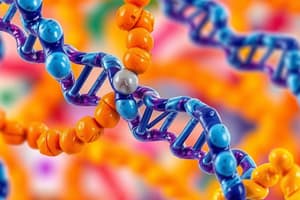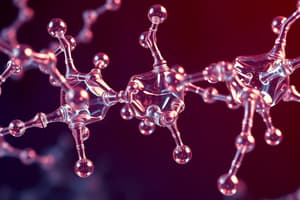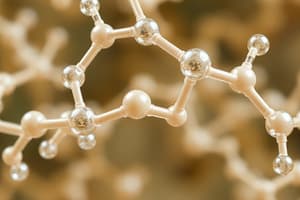Podcast
Questions and Answers
What can polymers that contain sugars do? (Select all that apply)
What can polymers that contain sugars do? (Select all that apply)
- Store hereditary information (correct)
- Store energy (correct)
- Protect cells (correct)
- None of the above
What kind of bond can unmodified sugars form?
What kind of bond can unmodified sugars form?
H covalently bound to the C of a C=O group.
What is the least that two molecules can differ, and still be called different kinds of sugars?
What is the least that two molecules can differ, and still be called different kinds of sugars?
The orientation of an OH group differs.
What is the difference between alpha and beta glucose?
What is the difference between alpha and beta glucose?
What happens when glucose forms a ring?
What happens when glucose forms a ring?
What is a carbonyl group?
What is a carbonyl group?
What is the principal fuel molecule in the human body?
What is the principal fuel molecule in the human body?
What can glucose be found in?
What can glucose be found in?
Is fructose a monosaccharide or a disaccharide?
Is fructose a monosaccharide or a disaccharide?
What is maltose?
What is maltose?
What is the storage form of carbohydrates in animals?
What is the storage form of carbohydrates in animals?
What is the storage form of carbohydrates in plants?
What is the storage form of carbohydrates in plants?
What is a polysaccharide?
What is a polysaccharide?
Name three polysaccharides.
Name three polysaccharides.
How do animals store energy?
How do animals store energy?
What is a disaccharide?
What is a disaccharide?
What is the sugar found in milk?
What is the sugar found in milk?
What is a monosaccharide?
What is a monosaccharide?
What is cellulose?
What is cellulose?
What is the most abundant organic compound on earth?
What is the most abundant organic compound on earth?
Fatty acids are hydrophilic.
Fatty acids are hydrophilic.
What are peanuts?
What are peanuts?
Flashcards are hidden until you start studying
Study Notes
Carbohydrates and Their Functions
- Polymers containing sugars are crucial for storing hereditary information, energy, and providing cellular protection.
- Glucose is the principal fuel molecule in the human body, found in ATP, DNA, and starch.
Sugar Structure and Variations
- Unmodified sugars can have an H covalently bonded to the carbon of a carbonyl (C=O) group.
- Sugars differ from one another based on the orientation of an -OH group.
- The main difference between alpha and beta glucose lies in the orientation of one of the -OH groups.
- When glucose forms a ring structure, it loses its carbonyl group.
Types of Sugars
- Monosaccharides consist of simple sugars, which can be represented by the formula (CH2O)n.
- Fructose is classified as a monosaccharide, while maltose is a disaccharide formed by linking two monosaccharides through dehydration.
- Lactose is the disaccharide found in milk.
Polysaccharides and Their Storage Forms
- Polysaccharides are complex carbohydrates made of many monosaccharides linked via dehydration reactions, including cellulose, starch, and glycogen.
- Glycogen serves as the storage form of carbohydrates in animals, whereas starch is used by plants for energy storage.
Cellulose
- Cellulose is a vital polysaccharide and holds the title of the most abundant organic compound on Earth.
- It provides structural support in plant cell walls.
Lipid Properties
- Fatty acids are characterized as hydrophobic, meaning they repel water.
- Peanuts are classified as unsaturated fats, contributing beneficial properties to diet.
Studying That Suits You
Use AI to generate personalized quizzes and flashcards to suit your learning preferences.



